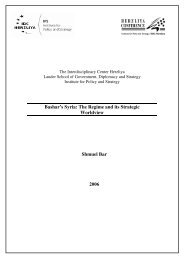Iran: Cultural Values, Self images and Negotiation Behavior
Iran: Cultural Values, Self images and Negotiation Behavior
Iran: Cultural Values, Self images and Negotiation Behavior
You also want an ePaper? Increase the reach of your titles
YUMPU automatically turns print PDFs into web optimized ePapers that Google loves.
<strong>Iran</strong>: <strong>Cultural</strong> <strong>Values</strong>, <strong>Self</strong>-<strong>images</strong> <strong>and</strong> Negotiating <strong>Behavior</strong>everything else, he is not unsympathetic to allowing others to gain a share of the goodlife.The best literary rendition of the type is to be found in the novel The Adventures ofHaji Baba of Ispahan written in 1824 by the British Representative at the Court ofPersia, James Morier. The book was translated into Persian <strong>and</strong> is widely perceived asone of the masterpieces of nineteenth century Persian literature (despite its being atranslation). It is popularly recommended by many <strong>Iran</strong>ians as a vade mecum forunderst<strong>and</strong>ing <strong>Iran</strong>ians. Hajji Baba is “always putting his nose into affairs that do notconcern him, <strong>and</strong> always getting involved in difficulties from which he extricateshimself by a triumphant display of wit <strong>and</strong> resourcefulness. He is no respecter ofpersons. He talks with kings as insolently as he talks with women, l<strong>and</strong>lords, <strong>and</strong>viziers. Gregarious <strong>and</strong> friendly, he scorns the world's malice <strong>and</strong> comes up laughingin the end.” 21Perceived Character Traits <strong>and</strong> <strong>Values</strong>Negative TraitsIn field studies, <strong>Iran</strong>ians tend to be extremely self-critical (at least towards the“national self”). Asked to characterize negative traits that are typical of <strong>Iran</strong>ian socialbehavior, they describe themselves (or more precisely the <strong>Iran</strong>ian urban elite – usuallythe Tehrani <strong>and</strong> Isfahani) with negative characteristics such as being manipulative(zad-o–ban-chi), calculating (hesabgar), opportunistic (forsat–talab), hypocritical ordouble-faced (motezhor, do-ru), dishonest (posht–e–ham–<strong>and</strong>az/ chaakhaan),“greasy” or obsequious (charb-zaban) <strong>and</strong> of dem<strong>and</strong>ing a commission (rantkhaar).22The custom of taking bribes or dem<strong>and</strong>ing a commission in state business deals(aptly called pour-cent or raant in modern <strong>Iran</strong>ian Persian) is widespread. Therefore,an <strong>Iran</strong>ian who engages in (<strong>and</strong> is paid for) services for outsiders does not incur thesame stigma that his Western counterpart would. 23 A wide range of <strong>Iran</strong>ian publicofficials (<strong>and</strong> their sons) are well known for having received "percentages" fromforeign companies, <strong>and</strong> while this has been exploited by the opposite political side, ithas not – as yet – produced the downfall of any public figure. This characteristic of<strong>Iran</strong>ian society has been the focus of much of the Reformist movement’s political <strong>and</strong>economic agenda, but with little or no real results. This is not to say that bribery isperceived as socially positive. The paradigms of <strong>Iran</strong>ian national heroes – either21 Robert Payne, The Splendor of Persia: The Great Kings (New York, 1957) quoted in William StearnsDavis, Readings in Ancient History: Illustrative Extracts from the Sources, Vol. 2: Greece <strong>and</strong> the East(Boston: Allyn <strong>and</strong> Bacon, 1912) 58-61.22 Bateson Safa-yi Batin, 262. They were tested against the <strong>Iran</strong>ian respondents of this study <strong>and</strong> foundto be still widely accepted.23 The level of high tolerance of <strong>Iran</strong>ian society towards corruption raises the question regarding theeffectiveness of running “agents of influence.” According to a former British diplomat who served in<strong>Iran</strong>, such “operations” have been short-term <strong>and</strong> conditional. Acceptance of benefits or even directpayments did not create a sense in the eyes of the <strong>Iran</strong>ian recipient that he is utterly obligated to theforeigner. In many cases, the <strong>Iran</strong>ian “agent of influence” did not renege directly, but rather createdcircumstances that rendered impossible the act he had to perform (private communication).8
















